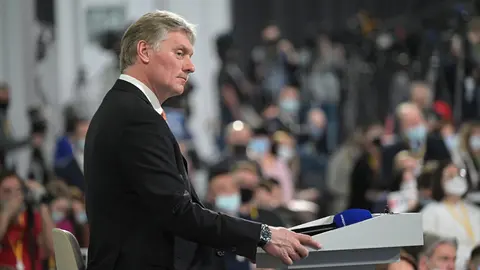A Russian company that exports electricity to Finland has announced plans to stop supplies at short notice, raising fears that Moscow is using energy supply to threaten and punish opposition to the Kremlin's war on Ukraine.
Helsinki-based Rao Nordic said on Friday that no more electricity from Russia would flow to Finland as of a day later, citing a missed payment.
"We are therefore forced to stop importing electricity from May 14 onwards," the company said in a statement.
Rao Nordic describes itself as one of the leading importers of Russian electricity to the Scandinavian countries. It is part of Inter Rao, Russia's largest energy company in the import-export business.
The supply freeze coincides almost exactly with an upcoming decision by Finland's governing party over whether the country should join NATO, a question that has gained urgency since Russia invaded Ukraine nearly three months ago.
Finland's Social Democrats are due to announce a position on whether to join the alliance on Saturday.
Russian threats
Finnish Prime Minister Sanna Marin and President Sauli Niinistö have already voiced their support for joining, and if this position is backed by the party, the Finnish parliament would be broadly in favour of the move.
Moscow has vowed to "respond accordingly" if Finland joins NATO and some observers speculated about a possible interruption of energy supply, although there was no explicit connection with the announcement concerning supply on Friday.
Finland is Inter Rao's most important export market, buying 8.2 billion kilowatt hours of electrical energy in 2021 of a total of 21.77 billion kilowatt hours exported abroad.
In April, the Finnish electricity grid operator Fingrid announced that it would reduce its business with Russia and lower imports because of the international situation, Russian media reported.
Energy is emerging as a tense area with Russia, with many western countries opposed to Moscow's ongoing bombardment of Ukraine and reluctant to continue funding the war but lacking alternative sources of energy.
Earlier on Friday, the Austrian government threatened to take measures against Russian energy giant Gazprom, for failing to fill a key gas storage facility near the Bavarian border.
The Haidach gas storage facility is also one that is important for German supplies.
Gazprom
The issue of ensuring such facilities are full has swung into focus amid the war in Ukraine and related fear of energy shortages as Germany and other countries seek to reduce their dependence on Russian supplies, in order to avoid funding Moscow's invasion of its neighbour.
Vienna plans to look to other companies to fill the facility if Gazprom, which is partly owned by the Russian government, fails to fill it, the Austrian Environment and Energy Ministry said.
Companies belonging to the Gazprom Group use the Haidach site and Austrian law would need to be changed in order for other suppliers to be able to use it. "We are now creating the legal framework," Chancellor Karl Nehammer told the Kleine Zeitung newspaper.
Haidach, which is close to Salzburg, is one of Europe's largest underground natural gas storage facilities. It is important for both Germany and Austria, it is used to supply Germany, and part of the gas pumped there is then pumped back to supply the provinces of Tyrol and Vorarlberg.
"It's use it or lose it," Nehammer said. "If you use it, everything is OK, if you don't use it, other companies can access it."










